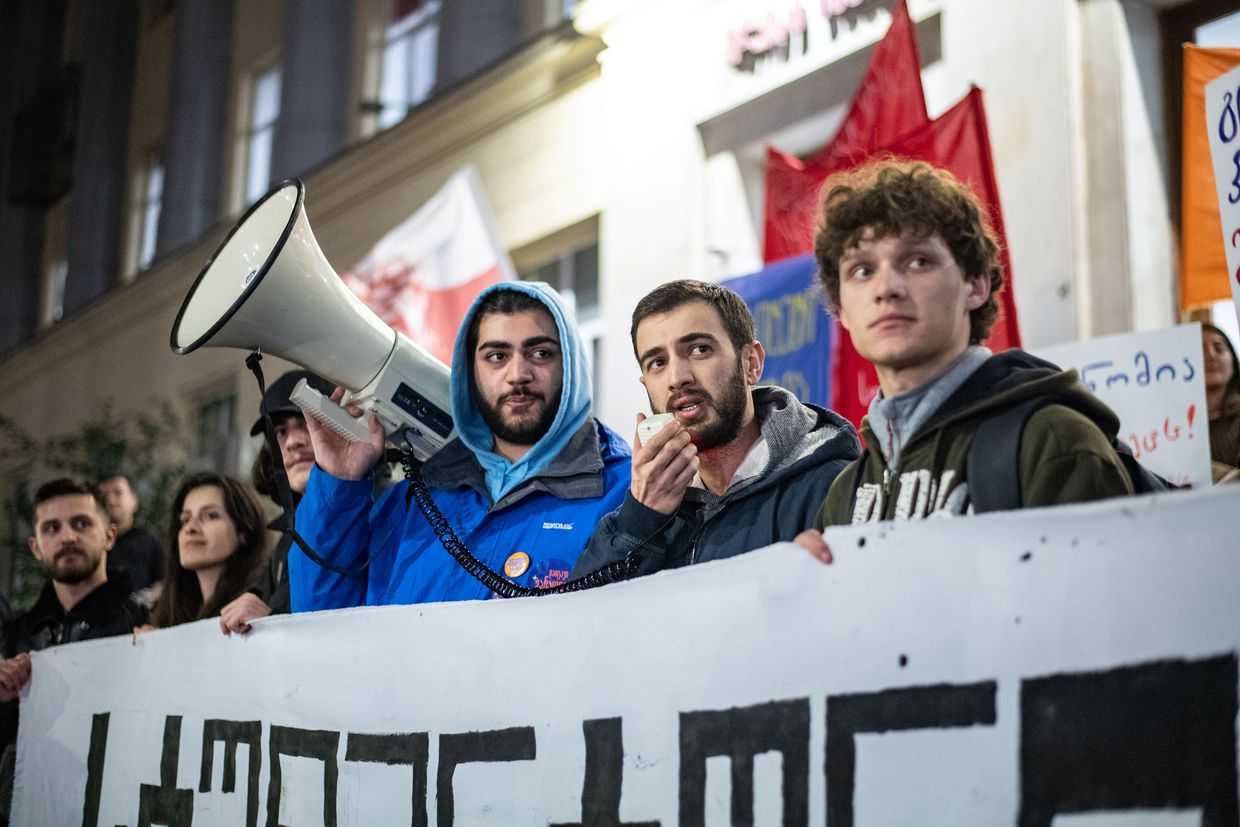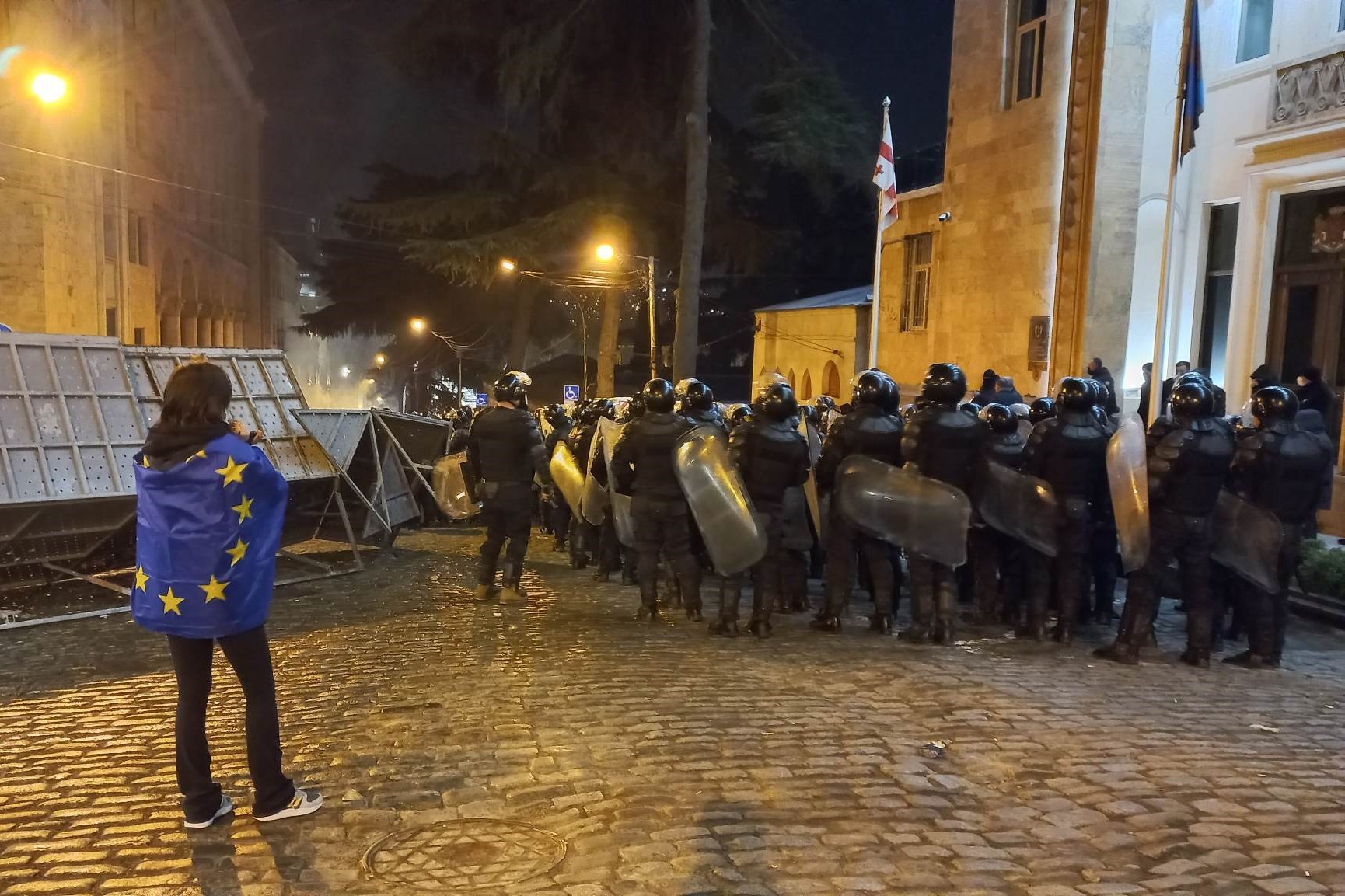
Tbilisi has seen a second night of violence as riot police deployed tear gas and water cannons to clear parliament from protesters against the draft foreign agent law. Pressure is continuing to mount on the Georgian Government, with international condemnation and local objections to the law continuing to pour in.
On Tuesday, tens of thousands gathered outside parliament in Tbilisi, with smaller protests taking place in Batumi, Kutaisi, Zugdidi, Poti, Akhaltsikhe, Marneuli, and Gori.
After a 22:00 deadline for the government to withdraw the bill passed, protesters attempted to surround the entrances to parliament in order to prevent lawmakers from pushing forward the law.
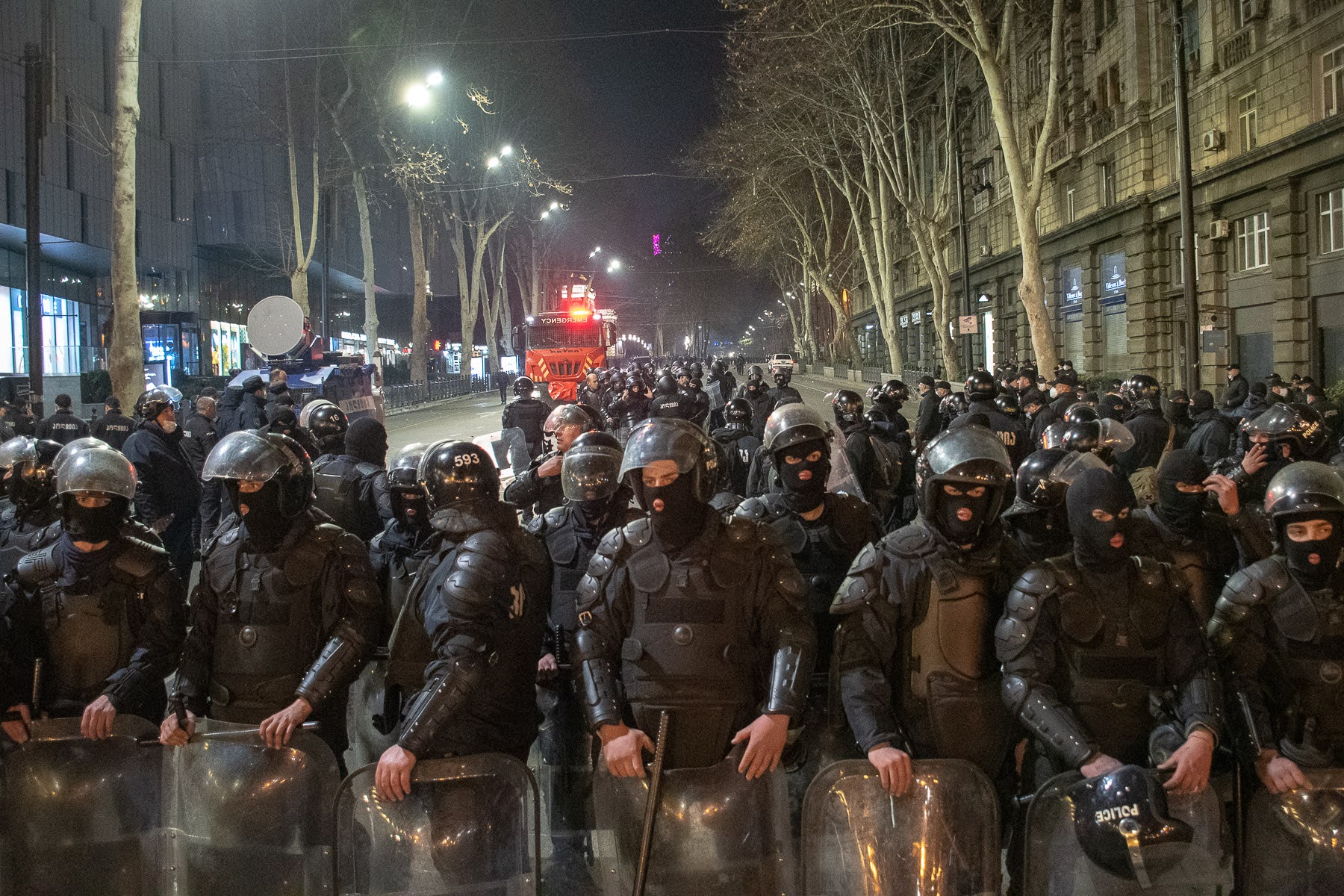
The bill passed its first hearing in parliament on Tuesday as tens of thousands of protesters gathered outside. The demonstration on Tuesday was met with riot police, who deployed water cannons, pepper spray, and tear gas to disperse protesters.
The police used similar tactics on Wednesday, as they cleared the streets around Parliament. This included Rustaveli Avenue, where a group of demonstrators overturned a police car.
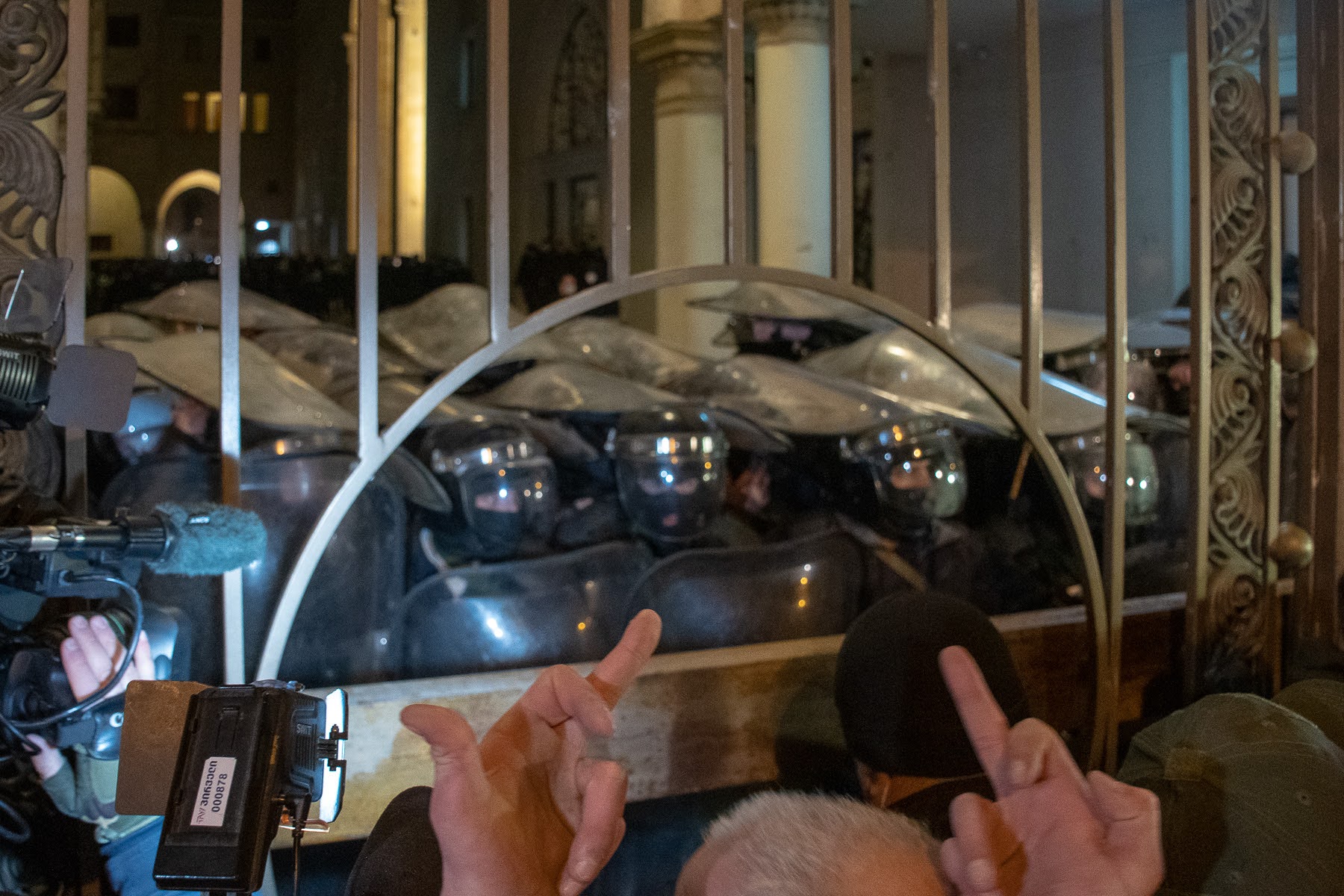
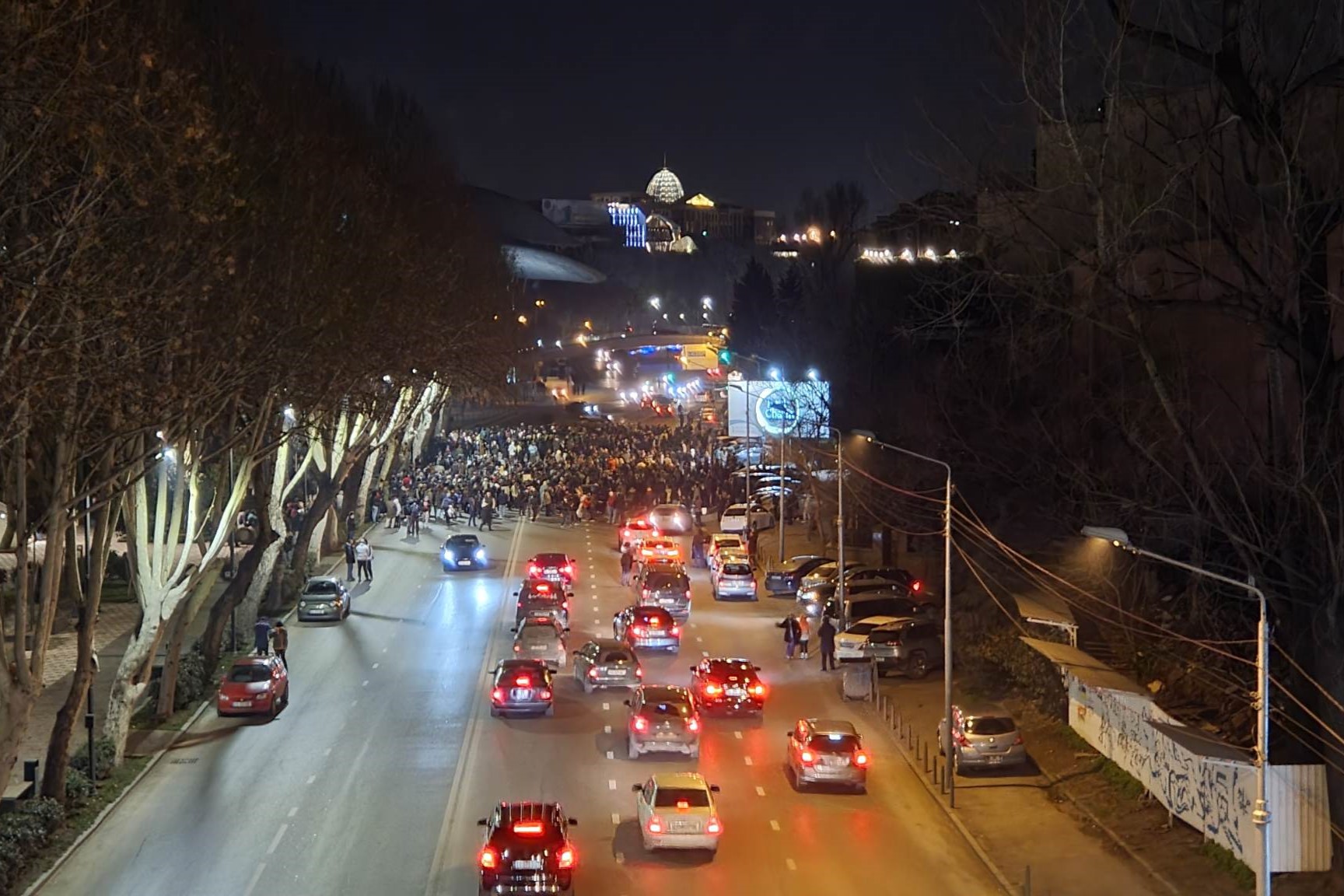
Police have been accused of using disproportionate force. During Wednesday’s dispersal, Bubu Gvadzabia, a reporter from Netgazeti, claimed that a riot police officer kicked him despite being warned he was a journalist.
The controversial bill, branded the ‘Russian law’ by critics because of its similarity to Russian legislation used to suppress civil society there, was forwarded to the plenary session unexpectedly on Tuesday — after previously being announced for Thursday. This triggered unplanned street demonstrations to restart, shortly after they had begun to disperse earlier that day.
[Read more on OC Media: Georgian foreign agent bills pass first reading as police use tear gas on protests]
On Wednesday morning, the Interior Ministry said that ‘around 50’ police officers were injured in Tuesday’s clashes with protesters, whom they accused of setting a police car on fire and throwing a molotov cocktail at the Parliament building. They also reported criminal charges against a 22-year-old man for allegedly attacking a police officer during the clashes.
After police began to deploy force, a minority of protesters threw stones at riot police and tore down the protective barriers in front of the parliament.
Police continued to use large amounts of tear gas against a dwindling number of protesters who remained peacefully on Rustaveli Avenue into the early hours of the morning.
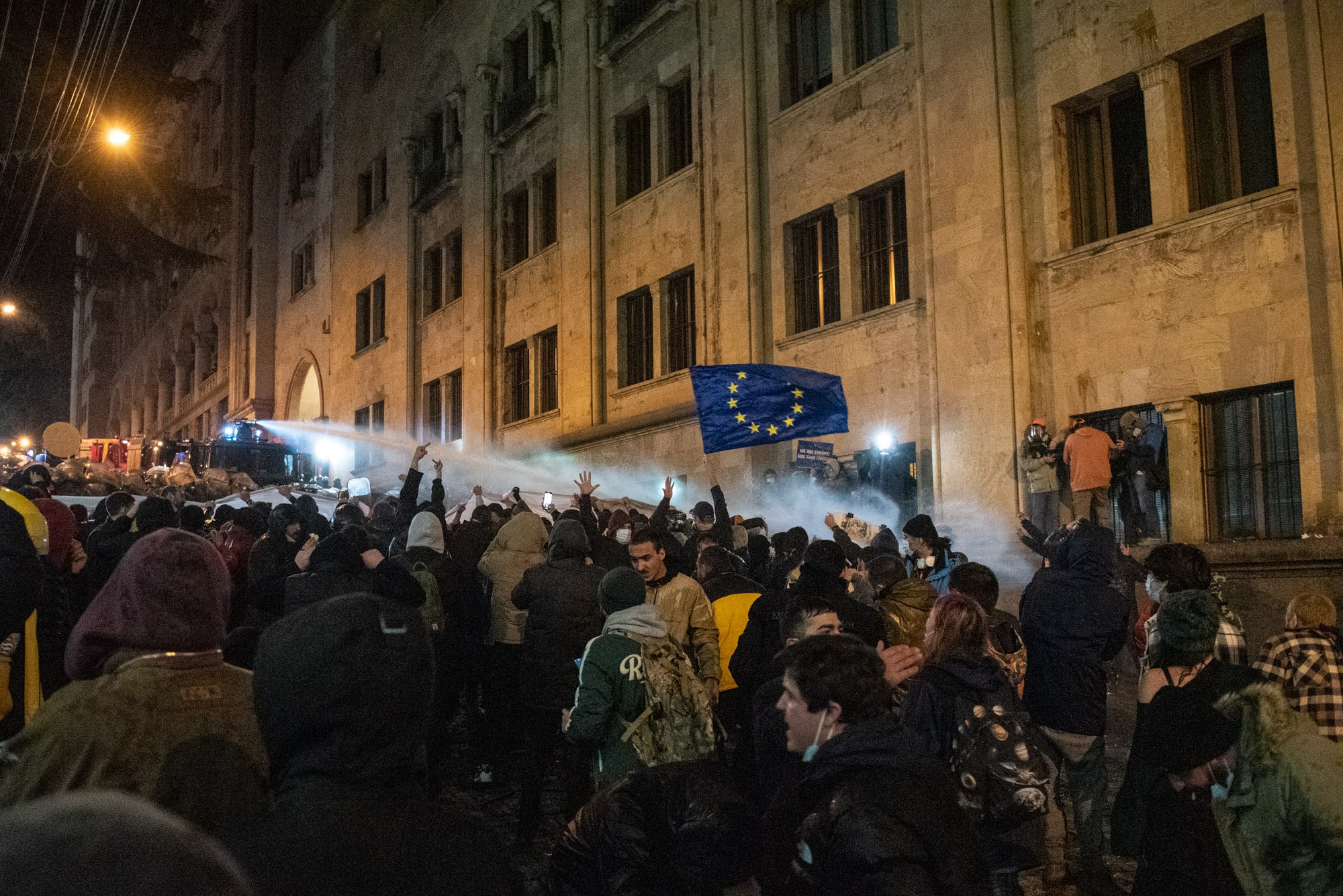
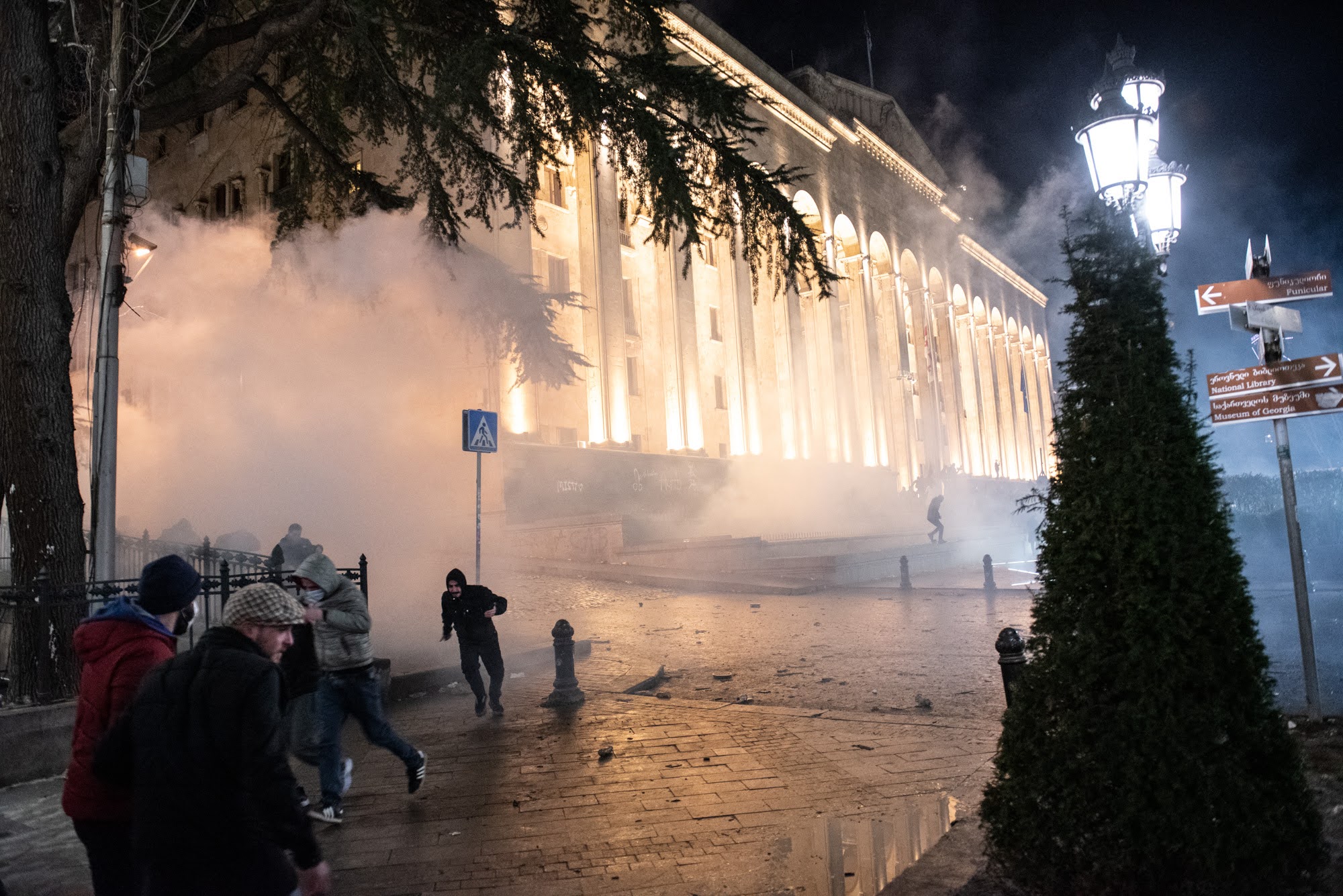
The Ministry reported 66 arrests on Tuesday night, including the chair of the opposition libertarian party, Girchi — More Freedom, Zurab Girchi Japaridze. He was hospitalised on the insistence of family members.
Japaridze was arrested by a group of unmasked men who appeared to hit him with batons during his detention. Today, Special Investigation Service announced an investigation into possible abuse of power by police officers during the incident.
On Wednesday, 10 Georgian rights groups issued a joint statement accusing police of using ‘disproportionate’ force, and of failing to differentiate between the largely peaceful gathering from a violent minority of participants.
On Tuesday evening, police also had to escort the Public Defender, Levan Ioseliani, from the area outside the Parliament after angry protesters pelted him with eggs and screamed ‘slave’ at him.
Ioseliani vowed to monitor police actions and connected the anger of some protesters with his affiliation with the Citizens Party. It was his first hours in his role, as parliament confirmed him as the new public defender hours before the anti-government demonstration.
Rustaveli Avenue remained unblocked for only a few hours, as by 17:00 on Wednesday, a group of students as well as a march to mark International Women’s Day joined others to fill the area outside the Parliament again.
‘Instead of fighting to strengthen our rights […] we are forced to counter this treacherous law from the government’, the Women’s March statement read.
Georgian Dream vows to push the bill
Georgian Dream has remained defiant despite the backlash against the foreign agent bill.
Party chair Irakli Kobakhidze has likened the protests against the bill to Ukraine’s 2014 Euromaidan Revolution.
‘What has Maiden brought to Ukraine? They had a war the very next year in which they lost Crimea and a large chunk of Luhansk and Donetsk […] Ukraine lost 20% of its territories’, he said in a press conference held during Tuesday’s protests. ‘This is exactly a result of processes that radicals want [to take place] in Georgia’.
He also berated Viola Von Cramon, a German MEP from the Greens–European Free Alliance, for her support of ‘radicals’.
During Tuesday’s protests in Tbilisi, Cramon accused the Georgian government of betraying Georgia’s constitution and its ‘European future’.
Kobakhidze defended the ‘foreign agent’ legislation and again described government critics as ‘detractors of the Church’.
[Read more on OC Media: Georgian Dream attacks critics of foreign agent law as enemies of the Church]
He denied again that the proposed legislation would undermine Georgia’s prospects to join the European Union.
‘We will march towards Europe with [our] Christianity. We will march towards Europe with [our] sovereignty. We will march forward with our dignity — towards Europe’, Kobakhidze said.
Both the European Council President, Charles Michel, and the EU foreign affairs chief, Josep Borrell, criticised the preliminary approval of the foreign agent law on 7 March.
Strongly concerned about developments in Georgia.
Right to peaceful protest is at the core of any democracy.
Adoption of this “foreign influence” law is not compatible with the EU path which majority in 🇬🇪 wants.
Commitment to rule of law and human values is key to EU project.
— Charles Michel (@CharlesMichel) March 8, 2023
Borrel described the vote as a ‘very bad development for Georgia and its people’.
‘This law is incompatible with EU values and standards. It goes against Georgia’s stated objective of joining the European Union, as supported by a large majority of Georgian citizens. Its final adoption may have serious repercussions on our relations’, Borrel warned.
Similarly, the US State Department spokesperson Ned Price claimed that the law in question ‘would strike at some of the very rights that are central to the aspirations of the people of Georgia for a consolidated democracy, for Euro-Atlantic integration’.
Price added that the adoption of the law ‘would be a setback to the ability of the United States to continue to be a partner for the people of Georgia’.
Hours before Kobakhidze’s press conference, Georgian President Salome Zurabishvili once again denounced the bill and insisted it ‘needed to be abolished’. She vowed again to veto it if adopted. Parliament has the power to overturn her veto.
While the timeline for bill’s proceedings remains vague, Georgian Dream claimed on Wednesday that they would wait for an opinion from the Venice Commission before voting moving ahead with its third and final reading. The commission was set up to assess if legislation is consistent with democratic and human rights norms.
The parliamentary majority has said they will no longer pursue an alternative version of the bill — which they dubbed an exact copy of the American Foreign Agents Registration Act.
Earlier on Wednesday, a group of students tore up a constitutional law textbook authored by the chair of the ruling Georgian Dream party, Irakli Kobakhidze.
The bill’s critics and supporters
Georgia’s ruling party had had a hard time selling the proposed foreign agents law to the public, even before the latest protests — not least because they have strongly signalled that the law is aimed specifically Western-funded groups in Georgia.
[Read more on OC Media: Georgian Dream hits out at ‘spies’ and Western-funded ‘extremism’]
‘The future of our country no longer belongs to either agents of a foreign country or to servants of a foreign country’, Georgian PM Irakli Gharibashvili insisted on 7 March. Weeks earlier, Kobakhidze insisted that labelling Western-funded non-profit group as ‘agents’ would not be used to smear them as ‘spies’.
Initially, the criticism of the draft law was dominated by voices coming from Georgia’s Western partners as well as local pro-western parties and major national watchdog groups. However, the ruling party faced wider public backlash domestically after they greenlit it for the parliamentary discussions in early March, with tensions on the street escalating since the the Tuesday vote.
Criticism has come from a wide range of groups, including businesses, sports teams, and celebrities.
Hours before 76 majority MPs approved the bill in the first reading, 14 former lawmakers that previously represented Georgian Dream in parliament urged the party to recall the draft law.
On Tuesday night, Georgian football star Khvicha Kvaratskelia was among the latest to signal his disapproval of the law, writing ‘Georgia’s future is in Europe’ on his Facebook page.
A similar sentiment was shared a day earlier by the iconic Georgian football club Dinamo Tbilisi, followed by a number of other sports clubs and celebrity sportspeople, including mixed martial artist and UFC star, Giga Chikadze, and Tornike Shengelia, captain of Georgia’s national basketball team.
Several journalists of the pro-government TV Imedi also voiced their disapproval of the law; after police dispersed thousands of protesters in Tbilisi on 7 March, Kakhka Kintsurashvili, an Imedi anchor, resigned in protest of the TV’s editorial policy.
Beyond the parliamentary majority, support of the foreign agent law was mostly limited to pro-government conservative activist and Alt Info, a pro-Russian extremist group.





